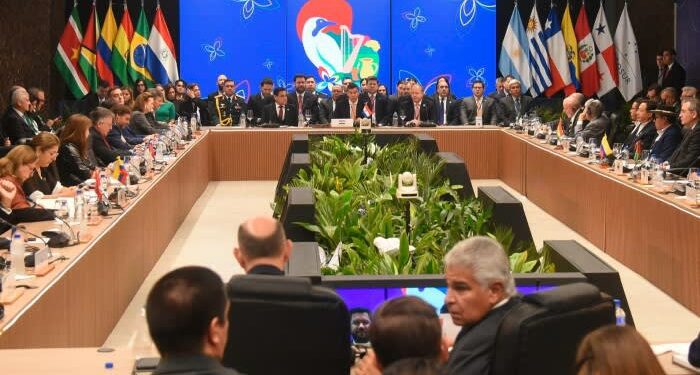Simply sign up to the EU trade myFT Digest — delivered directly to your inbox.
The EU and the Mercosur group of five South American countries aim to conclude negotiations for a long-delayed trade deal before the end of the year after making progress towards resolving contentious issues.
Officials from both sides have told the Financial Times there is fresh impetus to tie up the agreement, which is two decades in the making, despite French objections.
“It’s a geopolitical and economic necessity,” said an EU diplomat.
Mercosur, which includes Brazil, Argentina, Uruguay, Paraguay and Bolivia, is a sought after destination for EU exporters.
The agreement would create a market of 780mn people and save businesses in Europe more than €4bn annually in tariffs, according to the European Commission. EU companies have €330bn of investments in five South American countries.
The talks were dealt a blow after French President Emmanuel Macron in January stepped up his opposition to the deal, saying it would cause environmental damage and subject farmers to unfair competition.Â
But France has so far been backed only by Austria, which is insufficient to block a deal that requires a majority of the bloc’s 27 governments to be approved.
EU officials say they are now prepared to face down French opposition and insist the deal includes a commitment to implement the Paris Agreement, which pledges to keep global warming below 1.5 degrees Celsius.
Germany, Spain and many other member states have pushed hard for the deal, sealed in principle in 2019 but stuck in limbo ever since. Backers believe it will boost the economy and trade ties between the two blocs at a time of growing global tension.
Ursula von der Leyen, who was re-elected for a second term as commission president last month, has previously committed to finalising the agreement.
She is expected to travel to Rio de Janeiro in November for the G20 summit, which could provide an opportunity to resolve any outstanding questions with Brazilian president Luiz Inácio Lula da Silva.
Mercosur members complain that European concerns over the environment mask protectionist tendencies. BrasĂlia was angered by a side letter sent by Brussels last year that sought to add binding climate and deforestation commitments.Â
Other irritants include a separate EU anti-deforestation law, due to come into effect next year, which will ban the import of goods such as wood, beef and coffee produced on deforested land. Mercosur wants guarantees that the legislation will not in effect nullify the benefits of a trade deal for its exporters, said one official.Â
Another contentious issue is Brussels’ push for Argentina to curb the use of protected food names such as Parmesan cheese. Its big Italian immigrant community has long produced these delicacies. Meanwhile, BrasĂlia is keen on measures to safeguard its automotive industry. Â
In Europe, too, the agreement remains unpopular with farmers who staged mass protests this year over rising costs, falling profits and new regulations as Brussels tries to cut carbon emissions and improve biodiversity. They claim cheaper produce imported from South America is made to lower standards than those in the EU.Â
“We have some remaining issues that are important. It isn’t easy, but we have advanced a lot,” said another diplomat involved in the talks.Â
Paraguay’s president Santiago Peña told the Financial Times last week that he had “not seen much enthusiasm from the European countries to move forward”, though he acknowledged that von der Leyen and Macron had been busy with recent EU and French parliamentary elections.Â
While Argentine president Javier Milei expressed disdain for Mercosur during last year’s election campaign, he and his foreign minister Diana Mondino have both since said they support the agreement.
The commission said negotiating teams on both sides “continue to be in contact at technical level to progress on outstanding issues”.
Brussels added that it was focusing on “ensuring that the agreement delivers on the EU’s sustainability goals, while respecting the EU’s sensitivities in the agricultural sector”.
Source link : http://www.bing.com/news/apiclick.aspx?ref=FexRss&aid=&tid=66b1b409d90c4680aafdfa254bbc6ee4&url=https%3A%2F%2Fwww.ft.com%2Fcontent%2Fcae11511-f279-4466-9267-d978dfde6f6a&c=10059529590403869226&mkt=en-us
Author :
Publish date : 2024-08-05 17:04:00
Copyright for syndicated content belongs to the linked Source.












